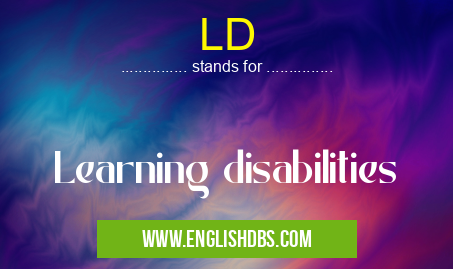What does LD mean in REHABILITATION
Learning disabilities (LD) is a term used to describe a range of cognitive and processing-based difficulties that affect individuals’ academic performance and everyday life functioning. It is estimated that up to one in five people may have some form of learning disability, commonly affecting areas such as reading, writing, mathematics or motor skills. LDs can occur along with other disabilities or conditions such as Autism Spectrum Disorder (ASD).

LD meaning in Rehabilitation in Medical
LD mostly used in an acronym Rehabilitation in Category Medical that means Learning disabilities
Shorthand: LD,
Full Form: Learning disabilities
For more information of "Learning disabilities", see the section below.
What Does LD Stand For?
The term “LD” is an abbreviation for “learning disability”. Individuals with learning disabilities may struggle to learn specific information or skills despite having adequate instruction and typical intelligence levels. Learning disabilities vary greatly from person to person and can involve difficulty with components of language, mathematics, memory, executive functioning, motor skills and social communication.
Types of LD
There are many types of learning disabilities that can be identified based on the area in which an individual experiences difficulty. These include dyslexia (difficulty with reading), dyscalculia (difficulty with math), dysgraphia (difficulty with writing), auditory processing disorder (difficulties hearing or understanding spoken language) and nonverbal learning disabilities (difficulties understanding nonverbal communication). Other types of learning disabilities include executive function deficits (problems with planning tasks or organizing information) and ADHD (attention deficit hyperactivity disorder).
Diagnosing LD
In order to diagnose a learning disability, individuals typically go through a comprehensive evaluation process involving psychological, educational and medical assessments. This process aims to determine if certain cognitive processes are causing difficulty for an individual when completing meaningful tasks like homework assignments or taking tests. This assessment also looks at the individual’s overall functioning in school as well as their family history in order to identify any patterns of behavior that may contribute to the difficulty. The evaluation results are then used to develop an individualized approach or plan designed specifically for the person’s needs.
Essential Questions and Answers on Learning disabilities in "MEDICAL»REHABILITATION"
What is learning disabilities?
Learning disabilities are a group of conditions that affect a person’s ability to receive, process, store and respond to information. Common types of learning disabilities can affect listening, speaking, reading, writing and mathematics.
Can people with learning disabilities learn?
Yes. With appropriate accommodations and support, people with learning disabilities can be successful in school, at work and in their daily lives.
What are signs of a learning disability?
Signs of a learning disability include difficulty concentrating or focusing on tasks; trouble recognizing letters or numbers; problems understanding language; difficulty expressing thoughts verbally or in writing; problems with math concepts like counting; struggling to remember facts; poor coordination; being easily confused or overwhelmed by new material and slow reading comprehension.
Are children born with learning disabilities?
It is not known for certain what causes most cases of learning disabilities. They may be genetic, due to medical conditions such as premature birth or fetal alcohol syndrome, environmental factors such as lead exposure in young children or due to acquired brain injury during infancy or development stages such as adolescence or adulthood.
How many different types of learning disabilities are there?
There are several types of specific learning disabilities including dyslexia (difficulty with reading), dysgraphia (trouble writing), dyscalculia (problems with numbers), auditory processing disorder (difficulties understanding spoken language) and nonverbal learning disability (struggles comprehending nonverbal cues).
Are there any treatments available for people with learning disabilities?
Yes. The key treatment for most forms of specific learning disability is special education which includes strategies such as providing extra time on tests; using assistive technologies like speech-to-text software and computerized readers that read aloud text on the screen; providing instruction that is tailored to the student’s particular needs; using visual aids like diagrams or charts to explain concepts more clearly and breaking down instructions into smaller components that are easier to understand.
Does having a learning disability result in other mental health issues?
Chronic frustration associated with trying to keep up in school may lead some individuals with specific learning disabilities to feelings of anxiety, depression and low self-esteem. For this reason it is important for these individuals to have access to psychological counseling if necessary.
: Is there any way I could help someone who has Learning Disabilities?
: It is important for those affected by LDs to have access to appropriate accommodations that meet their individual needs , so awareness about supports available through government services , schools , employers etc can go a long way towards helping them cope better .Beyond this , they need social inclusion , acceptance without judgment & encouragement from family & peers.
: Can Learning Disabilities get better over time?
: In general , no .Most LDs tend to persist throughout one's life but if identified early enough & paired up Strategically alongside proper supports & interventions , individuals affected by LDs can make observable progress towards improvement over substantial periods of time.
: Do all people living with Learning Disability require Special Education?
: Not necessarily .Many students who experience LDs find success through regular classrooms as well when provided the right kind of interventions & accommodations tailored according their individual needs & abilities.
Final Words:
Learning Disabilities can make it difficult for individuals to reach their full potential in life but this does not mean they cannot succeed. With early intervention, appropriate accommodations and support from educators and family members, individuals with learning disabilities can experience success both academically and socially.
LD also stands for: |
|
| All stands for LD |
